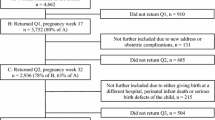Abstract
Fifty-four depressed and non-depressed mothers were interviewed when their infants were 3 and 12 months of age. The depressed mothers assigned greater vulnerability scores and their infants engaged in less exploratory play and had lower Bayley mental and motor scores. The depressed mothers' vulnerability scores at 3 months were related to less exploratory play in their infants as well as lower Bayley mental scores at 12 months.
Similar content being viewed by others
References
Field T: Infants of depressed mothers.Infant Behav and Develop 18:1–13, 1995.
Cohn JF, Matias R, Tronick EZ, Connell D, Lyons-Ruth K: Face-to-face interactions of depressed mothers and their infants. InMaternal Depression and Infant Disturbance, eds. Tronick EZ, Field T. San Francisco: Jossey-Bass, 1986.
Field T, Healy B, Goldstein S, Guthertz M: Behavior state matching and synchrony in mother-infant interactions of nondepressed versus depressed dyads.Develop Psy 26:7–14, 1990.
Cohn JF, Campbell SB, Matias R, Hopkins J: Face-to-face interactions of postpartum depressed and non-depressed mother-infant pairs at two months.Develop Psy 26:15–23, 1990.
Field T, Morrow C, Adlestein D: “Depressed” mothers' perceptions of infant behavior.Infant Behav and Develop 16:99–108, 1993.
Hammen C, Gordon G, Burge D, Adrian C, Jaenicke C, Hiroto G: Maternal affective disorders, illness, and stress: risk for children's psychopathology.Am J Psy 144:736–741, 1987.
Richters JE: Depressed mothers as informants about their children: a critical review of the evidence for distortion.Psychol B 112:485–499, 1992.
Richters JE, Pellegrini D: Depressed mothers' judgements about their children: an examination of the depression-distortion hypothesis.Child Dev 60:1068–1075, 1989.
Beck AT, Rush AJ, Shaw BF, Emery G:Cognitive Theory of Depression. New York: Guilford, 1979.
Seligman M:Helplessness: on depression, development and death. San Francisco: W.H. Freeman, 1975.
Bendell D, Yando R, Burke K, Snyder D: Perceptions of preschoolers' vulnerability by mothers who had delivered preterm.J Ped Psych 19:709–721, 1994.
Green M, Solnit AJ: Reactions to the threatened loss of a child: a vulnerable child syndrome.Pediatrics 34:58–66, 1964.
Boyce WT: The vulnerable child: new evidence, new approaches.Adv in Ped, 39:1–32, 1992.
Bendell D, Field T, Yando S, Lang C, Martinez A, Pickens J: “Depressed” mothers' perceptions of their preschool children's vulnerability.Child Psych and Hum Dev 14:183–190, 1994.
Perrin E, West P, Culley B: Is my child normal yet? Correlates of vulnerability.Pediatrics 83:355–363, 1989.
Achenbach TM, Edelbrock CS:Manual for the Child Behavior Checklist and Revised Child Behavior Profile, Burlinton, VT: University Associates in Psychiatry, 1983.
Abrams SM, Field T, Scafidi F, Prodromidis M: Maternal “depression” effects on infants' Brazelton Scale performance.Inf Men H J. In Press, 1994.
Field T: Infants of Depressed Mothers.Develop Psychop 4:49–66, 1992.
Fendson L, Schell RE: The origins of exploratory play.Early Child Develop Care 19:3–14, 1985.
Voss H, Keller H: Curiosity and exploration: a program of investigation.Ger J Psychol 10:327–337, 1986.
Canella GS, Berkeley TR, Constans TM, Parkhurst SA: Cognitive processes of atrisk and typically developing infants: comparison of exploration, play, and problem solving.Child Study J 17:269–286, 1987.
Beck AT, Ward CH, Mendelson M, Mock J, Erbaugh J: An inventory for measuring depression.Arch G Psyc 4:561–571, 1961.
O'Hara M, Rehm L, Campbell S: Postpartum depression: a role for social network and life stress variables.J Nerv Ment 171:336–341, 1983.
Field T, Morrow C, Healy B, Foster T, Adlestein D, Goldstein S: Mothers with zero Beck Depression scores act more “depressed” with their infants.Develop Psychop 3:253–262, 1992.
Lyons-Ruth K, Zoll D, Connell D, Grunebaum HE: The depressed mother and her one-year-old infant: environment, interaction, attachment and infant development. InMaternal depression and infant disturbance, eds. Tronick E, Field T. San Francisco: Jossey-Bass, 1986.
Forsyth B, Canney P: Long term implications of problems of feeding and behavior in early infancy: a 3-1/2 year follow-up presented at the Ambulatory Pediatric Association, Washington, D.C., 1985.
Wirt R, Lochar D, Kleindienst J:Personality Inventory for Children. Los Angeles: Western Psychological Services, 1982.
Field T: Interactions of high-risk infants: quantitative and qualitative differences. InCurrent perspectives on psychosocial risks during pregnancy and early infancy, eds. Sawin DB, Hawkins RC, Walker L, Penticuff J. New York: Brunner/Mazel, 1980.
Bakeman R, Gottman J:Observing interaction: an introduction to sequential analysis. New York: Cambridge University Press, 1986.
Bayley N:Bayley scales of infant development. New York, NY: Psychological Corporation, 1969.
Author information
Authors and Affiliations
Additional information
This research was supported by an NIMH Research Scientist Award (#MH00331) and an NIMH Research Grant (#MH46586) to Tiffany Field.
Rights and permissions
About this article
Cite this article
Field, T., Estroff, D.B., Yando, R. et al. “Depressed” mothers' perceptions of infant vulnerability are related to later development. Child Psych Hum Dev 27, 43–53 (1996). https://doi.org/10.1007/BF02353445
Received:
Revised:
Accepted:
Issue Date:
DOI: https://doi.org/10.1007/BF02353445




